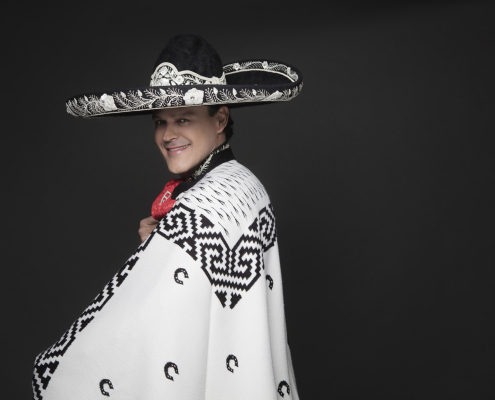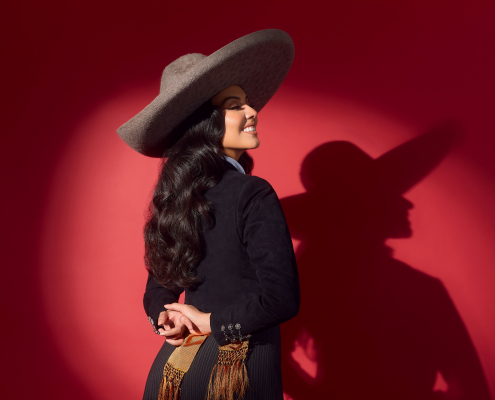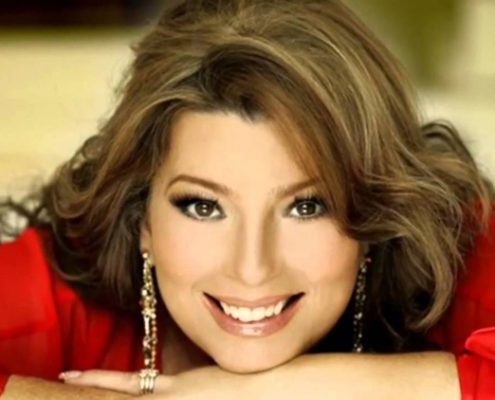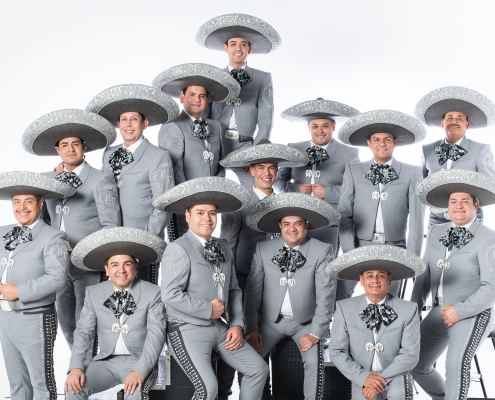 Mariachi Vargas de Tecalitlan
Mariachi Vargas de Tecalitlan 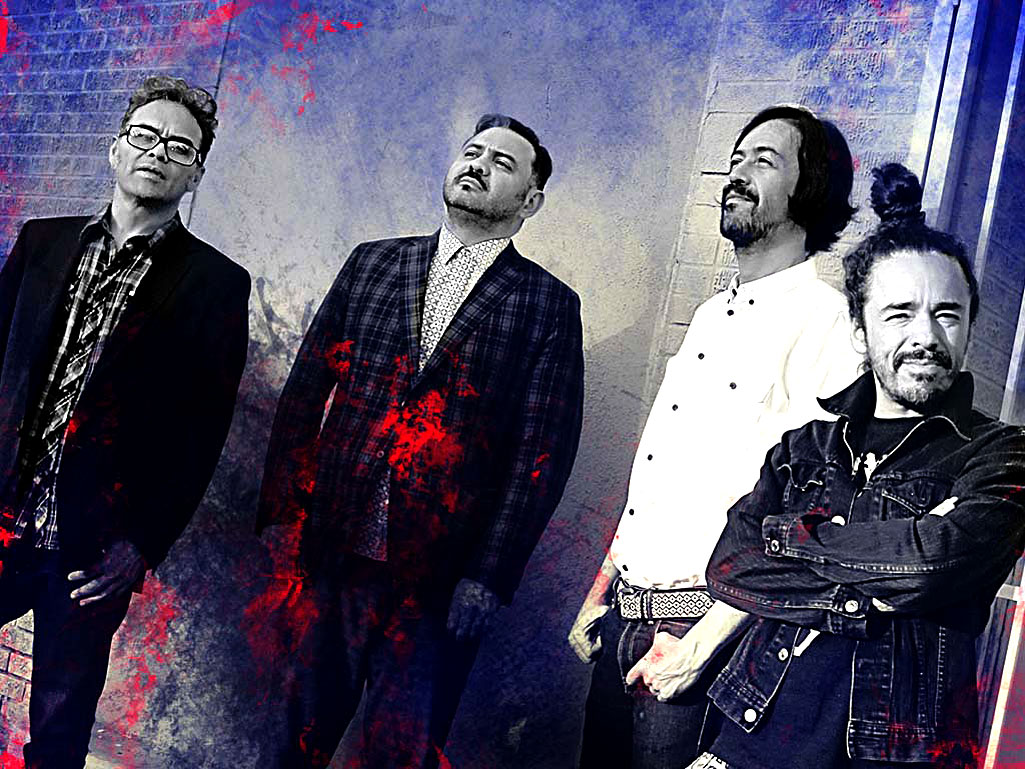
About Cafe Tacvba
Enter Café Tacvba: in 1989, this quaintly traditional and Indian-sounding moniker, the name of a locally famous downtown Mexico City restaurant, was appropriated by four young guys from American-inspired suburbs of the confusingly denominated State of Mexico, which surrounds two quadrants of the megalopolis Distrito Federal, the entity that used to contain and now percolates with the urban sprawl collectively known as Mexico City.
Singer Elfego Buendía (real name: Rubén Albarrán, who’s changed his stage name throughout the group’s evolution, from Pinche Juan to Cosme to Anónimo to Nrü (pronounced Dshiu!) to the absolutely unfathomable Amparo Tonto Medardo In Lak’ech to Gallo Gasss to his current moniker, Elfego Buendía) met Joselo Rangel while they were both studying graphic design at Mexico City’s Metropolitan Authonomous University, drawn together by their common fondness for Anglo post-punk rock.
They both brandished guitars, and Joselo’s younger brother Quique, also a student at the university, joined on bass. A friend of Quique’s introduced them to his keyboard-playing engineering student neighbor, Emmanuel “Meme” Del Real. Together, they formed Café Tacvba, and set upon trying to make their mark in the budding local rock scene.
While drawing equally from the wells of just-pressed and long-valued British rock, they also absorbed the local influence of the Cuban percussion-infused Ritmo Peligroso (Mexico City’s first punk rockers, ‘Dangerous Rhythm’), the nationalistic satire of the seminal Charrock’n’rollers Botellita de Jerez (literally, ‘Little Sherry Bottle,’ a phrase rhymed in a traditional child’s wordplay with “everything you say will turn out the opposite”), and the wordy compositions of Jaime López (the Mexican Leonard Cohen, for lack of a homegrown Dylan).
The Next Steps
Once they took the quantum leap of forging a new musical form that would merge the free arrogance of rock with traditional Mexican music and the bubbling cauldron of their own diverse individual influences, the group also chose to leave behind most of the characteristically plugged-in paraphernalia of modern rock. Taking a cue from the Violent Femmes, they substituted proud electric guitars with a gut-stringed Mexican-made acoustic and a full-size double bass of redoubtable ancestry.
Out of necessity, Meme manned a simple, rhythm machine-equipped electronic keyboard, balancing it with the wheeze of the breath-blown Melodica that became his lead instrument. Lacking a human drummer from the very inception of the group may well be one of the factors that have kept Café Tacvba sane and together for over a decade.
With this meager instrumentation and Ruben’s Johnny Rotten-style baked delivery, Café Tacvba booked themselves at every single hole in the wall that would have them in the growing – but still marginal – Mexican rock scene of 1989. It was during one of those formative gigs that Gustavo Santaolalla, veteran Argentinean musician turned producer, heard them. He was adamant that they should record immediately, but the Tacubos did little to speed up the process until presented with a recording contract, preferring the seedy stages they’d discovered to the relative sterility of the studio.
Their first self-titled album, released in 1992, included crowd favorites – they had a loyal cult following by then – like the bouncy “Banda Rockera” (named after a populist rock fanzine, but actually about a punky girl “from High School 23”) and the ineffable “Rarotonga” (about the exotically seductive heroine of a popular comic whose commercial slogan was “make me yours every Tuesday”). However, it was the much gentler “Maria,” a straight romantic song, and the sweetly melodic “Las Persianas” (based on a successfully filmed short story by renowned poet José Emilio Pacheco about the sexual awakening of a boy who has an affair with a schoolmate’s mother) that allowed them to cross over to the much broader lighter-waving general audience.
Sales of Café Tacvba topped label expectations in record time, making the group the quickest success in the three decade-long history of Mexican rock and turning them into a hot live ticket. The band toured extensively within Mexico and made their first forays into the U.S. (at their S.O.B.’s “Latin Nights” concert; an inspired British reviewer came up with the excited comparison: “These guys are the Mexican Pogues!”).
But even the acknowledged monarchs of Irish musical lunacy have never broken so many barriers in one fell swoop as Café Tacvba did with the release of their 1994 sequel, Re. Immediate critical comparisons to the Beatles’ ultra diverse White Album were made in lieu of an apt way to describe the seamless, yet boundless eclecticism the adventurous foursome managed to squeeze within the album’s 20 strong cuts. Pre-Colombian buskers with Eno-ish flourishes in the UFO tale “El Aparato”; rough and tumble norteños in the – literally – breath halting “La Ingrata”; the tongue (in cheek) twisting hardcore of “El Borrego”; the battle of industrial noise vs. loungy harmonies in “24 Horas”; tongue-twisting banda ska that turns a mosh pit into a village fiesta in “El Fin De La Infancia” (titled after Arthur C. Clarke’s epic Childhood’s End – Joselo is a major science fiction fan); a ‘50s-style romantic trio that dares to reckon that traditional architecture tends to be capped by pigeon shit in “Madrugal”; pachuco R&B that hails a barrio chieftain in “El Tlatoani del Barrio”; a heavy, but not metallic paean that equates Columbus’ ship with the fine art of skipping class in “La Pinta”; even a passionately naïve homage to the aphrodisiac potential of setting the disco floor on fire (“El Baile y El Salón”), followed by an old style Cuban son that sets its low down tone with the ominous first phrase “Ni hablar, mujer/Tú traes puñal” (‘No contest, woman/ You’ve got a knife’) before releasing its danzón (the only dance in the world that is performed on top of a brick) tension in a salsa descarga that repeats again and again “¡Ya no puedo más!” (‘Can’t take it no more!’), then doubles time in a climactic Mambo finale potentially dangerous to the aerobically-challenged. And it all ends with a peacefully under-recorded ragtime Rudy Vallee would’ve loved to cover! No wonder the first live performances of Re’s songs were met with gaping mouths, hardboiled egg eyes and precious little applause. This changed, through an aggressive tour schedule that injected the band’s stage presentation with a collective and contagious energy that was heartily reciprocated by their audiences, turning their steadily sold out concerts into genre-busting bacchanalian fiestas.
Around this time, a new batch of songs was poised to become the next Café Tacvba album, but the demand for the band onstage precluded their holing up in the studio to let them grow. Instead, the much toyed-with notion of doing an album of “covers” to encompass their formative influences became a true alternative to bypass the heavy concentration that fine-tuning and recording the new originals would require.
No one imagined their third recording, the relaxed “quickie” Avalancha de Éxitos, would become just that: an unexpected avalanche of unlikely hits that would further solidify Café Tacvba’s pioneering role within the growing realm of what the international music media was already calling the “Rock en Español” movement. Working once more with their by now customary producer Gustavo Santaolalla, the foursome applied their only seemingly naive creativity to an heterodox grab bag of tunes and recorded them all in a befittingly random manner. The loungy instrumental version of the ‘40’s romantic composer Alberto Dominguez’s “Perfidia” to the internationally successful Dominican bachata king Juan Luis Guerra’s “Ojalá que llueva café” (‘Hope it rains coffee’), morphed into a wildly celebratory son Veracruzano; tunes as well known as Ignacio Cano’s (1/3 of famous Spanish pop trio Mecano) “No Controles” – originally a big hit in Mexico by the pre-Spice Girls pioneer outfit Flans – as arcane as the disco parody “Metamorfosis” (by the virtually unknown, battle of the band-winning local heroes, Axis), all led by the unlikeliest hit single of the decade : “Chilanga Banda”, a near impenetrable caló (street slang) rap by renowned pioneer rock songwriter Jaime López which, once subjected to Tacvba’s group alchemy, stepped over these formidable language barriers to become a hit in most of Spanish-speaking Latin America. (The single’s promo material actually included a polite translation into Spanish). The industrial strength, downright weird “No Controles” and its follow-up “Cómo Te Extraño”, originally a candid, tender and melodic ‘70’s hit by its author, Argentinean balladist Leo Dan, completed the album’s winning strange single sequence.
Chéverecachaimachochidoché is the tongue-twisting composite name (compromised of five Latin slang words for “swell”) of the sweeping continental tour Café Tacvba trekked through as an encore to its unstoppable Avalancha (also the street name for a kid’s boxcar racer). No modern Latin rock group had played 59 dates in 13 different countries before, but Café Tacvba received standing ovations all the way through, from Santiago de Chile to Manhattan’s Central Park. This latest foray into the Big Apple (by then augmented by the talented huasteco violinist and jaranero Alejandro Flores) prompted admiring comments from David Byrne, Newsweek and The New Yorker, setting the little suburban group that could as international priority artists for the global media conglomerate that is Warner Music. Not bad for a bunch of guys who weren’t so interested in recording, huh?
Nearly burnt out by the pressures of their pioneering intercontinental megatour, the Tacubos dispersed to opposite cardinal points for a while and came back to try to reinvent themselves, something they accomplished, Brian Eno-style, by a simple but transcendent change of strategy. Up to then, they had all shown up for rehearsals with individual songs in search of an arrangement. This time, they decided, they would start from scratch on a blank canvas of free musical interaction, and, apparently acting upon Ruben’s proposal/demand that he did not want to be typecast as “the singer,” they all agreed to exchange instruments in search of freshness. This anarchic method probed a temporary flurry at the first listening meeting with the band’s label.
You see, Revés, Café Tacvba’s 1999 opus, is an instrumental album. And don’t look for comforting examples: it’s an outright experimental search for new and undecipherable sounds whose quite obscure precedent could be XTC’s collective Go Plus, or perhaps their leader Andy Partridge’s only solo and suitably arcane album, (Take Away) The Lure of Salvage. Never mind if you haven’t heard either of them; neither had the members of Café Tacvba.
The label was nervous that the bold instrumental gesture could turn out to be a suicidal career move. So they begged and threatened, cried and conferred until a compromise was reached: remember the parcel of songs Tacvba was supposed to record before Avalancha crashed on them? Well, motivation got the best of them, and they recorded a second, separate album with lyrics, and packaged it together with the instrumental album, turning their new release into a double album sold at single album price, cryptically titled Revés/Yo Soy (Backwards / I Am, a misleading direct translation because these guys are not merely forward, but brilliant). The 2-CD set won the Latin Grammy for Best Rock Album of the Year (1999).
After joining Beck, on his Midnight Vultures tour, Café Tacvba returned home and contributed original songs to the soundtracks of the acclaimed Mexican films Amores Perros and Y Tu Mama Tambien, and collaborated with the Kronos Quartet on last year’s Grammy-nominated album, Nuevo. Joselo wrote and recorded a solo album, Oso, and Elfego performed some shows in Mexico City with a post-modern ensemble.
In 2002, Café Tacvba signed a new global deal with MCA Records, and while writing songs for their next full-length album, they released “Vale Callampa,” a whimsical and fun 4-song EP tribute to their friends and contemporaries in the brilliant but recently disbanded Chilean band Los Tres, a group that had evolved on a course similar to Cafe Tacvba’s over the years.
This brings us to today. Café Tacvba have emerged from studios in Los Angeles, CA, Buffalo, NY and Mexico City, holding an album of 14 new songs. Collaborating with producer Gustavo Santaolalla and engineer Anibal Kerpel, the Tacubos decided to also work with two other producers they admire, Dave Fridmann (Flaming Lips, Mercury Rev) and Andrew Weiss (Ween), to create a journey of songs: Cuatro Caminos (‘Four Roads’, also the name of a busy subway station and major intersection in Mexico City). The band’s most lush, both-Martin-and-Spector-would-be-proud outing yet, the album bursts with intensity of sound and of silence, where hushed and haunting echoes meet crashing waves and yelping outbursts. It’s one hell of a ride, from the driving guitars of the album’s opening track, “Cero y Uno” to the manic, hyper-kinetic bop and sputter of leading single, “Eo (El Sonidero),” an ode to the soundman whose sonic prowess makes the people dance, to the soaring, evaporating vocal and instrumental whisps of the album’s closing salutations in “Hola, Adios.” Cuatro Caminos is a sonic canvas of people and places that have been or are yet to be discovered, explored, and loved.
Related Artists
 Mariachi Vargas de Tecalitlan
Mariachi Vargas de Tecalitlan 


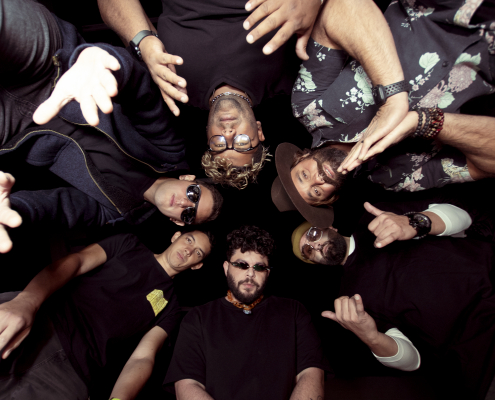 LA TRIBU ROYALE
LA TRIBU ROYALE